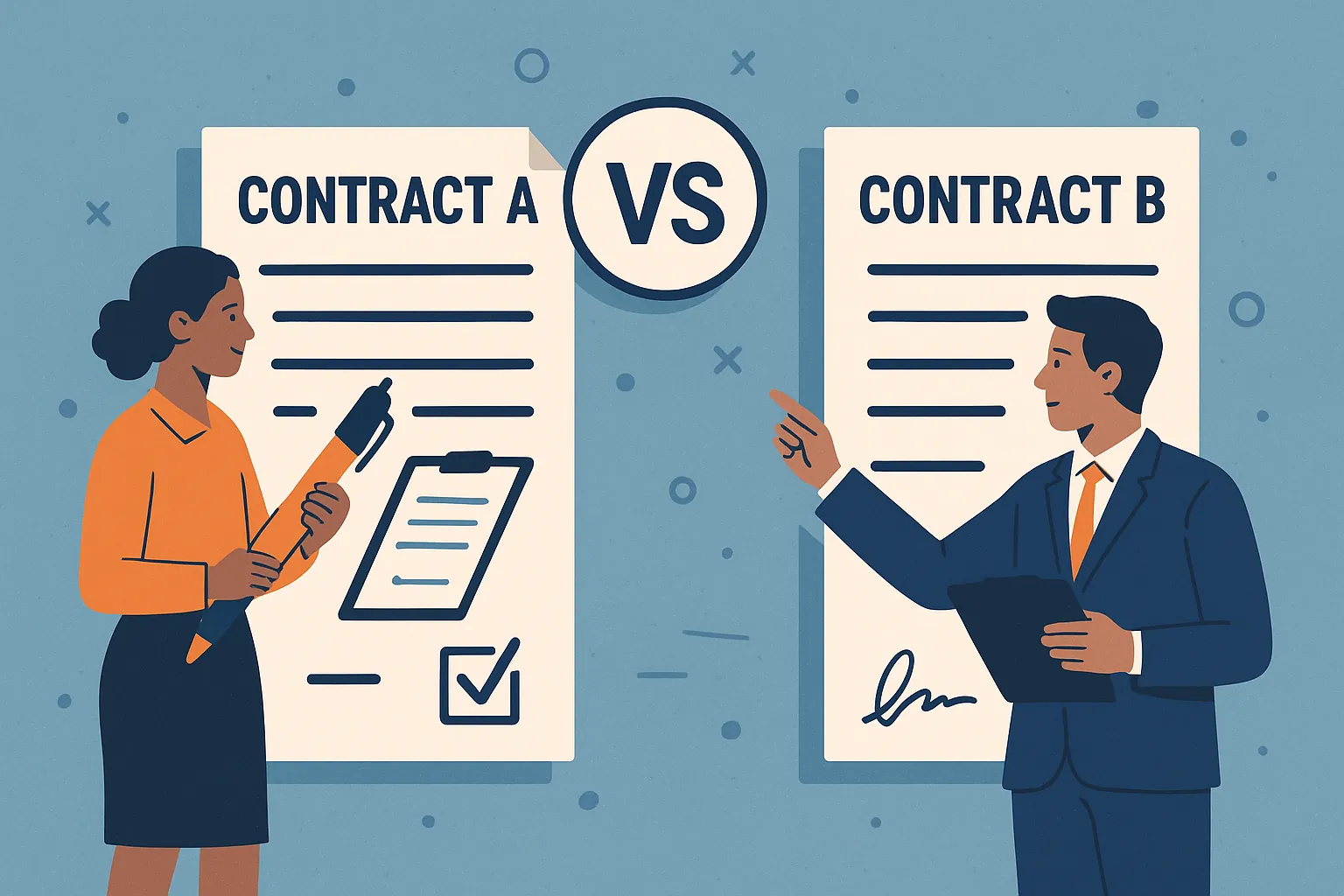Introduction
The terms contract administration and contract management are often used interchangeably, yet they represent distinct phases within the contracting workflow. Understanding these differences is not merely academic; it is essential for ensuring project success and maintaining effective operational processes.
Contract administration refers to the activities that occur before a contract is signed. This phase involves the preparation, negotiation, and establishment of the terms and conditions that will govern the relationship between the parties involved. It sets the foundation for what is to come, ensuring that all parties have a clear understanding of their obligations and expectations.
On the other hand, contract management encompasses the broader spectrum of activities that take place after a contract is executed. This includes monitoring compliance with the contract terms, managing performance, and ensuring that deliverables are met as specified. Contract management is crucial for maintaining the integrity of the agreement and for addressing any issues that may arise during the contract’s lifecycle.
Understanding the distinction between these two processes is vital for project managers and contract administrators. Effective contract administration lays the groundwork for successful contract management, which in turn is critical for achieving project objectives and minimizing risks. By recognizing the unique roles and responsibilities associated with each phase, professionals can enhance collaboration, improve supplier relationships, and ultimately drive project success.
This discussion is particularly relevant for project managers and contract administrators, who play pivotal roles in navigating the complexities of contract-related activities. By delving into the nuances of contract administration and contract management, these professionals can better equip themselves to handle the challenges that arise in their respective fields, ensuring that projects are completed on time, within budget, and in accordance with contractual obligations.
Defining Contract Administration
Contract administration plays a pivotal role in the project lifecycle, serving as the foundation for effective contract management. It encompasses the processes and activities that occur before a contract is signed and continues through its execution. Here’s a closer look at the key aspects of contract administration:
- Role in the Project Lifecycle: Contract administration focuses on the pre-signing activities, which include planning, negotiation, and sourcing. It sets the stage for the contract’s execution by ensuring that all terms are clearly defined and agreed upon by all parties involved. This phase is crucial as it lays the groundwork for the successful management of the contract once it is in effect [11].
- Key Responsibilities and Tasks: The responsibilities of contract administrators are diverse and critical to the success of a project. They include:
- Defining Scope and Deliverables: Clearly outlining what is expected from all parties involved in the contract [9].
- Setting Terms and Conditions: Establishing the legal and operational framework that governs the contract [11].
- Creating Detailed Timelines: Developing a timeline that accounts for all important milestones throughout the contract’s life, including start and end dates [1].
- Financial Planning: Sorting out financial obligations and ensuring that budgetary constraints are adhered to [9].
- Risk Anticipation: Identifying potential risks and planning for contingencies to mitigate them [9].
- Importance of Compliance and Monitoring: Compliance is a critical aspect of contract administration. It involves ensuring that all parties adhere to the agreed-upon terms and conditions. Monitoring is equally important, as it allows contract administrators to track performance and address any issues that may arise during the contract lifecycle. This proactive approach helps in maintaining the integrity of the contract and ensures that project objectives are met [10][12].
Defining Contract Management
Contract management is a critical component of project management that encompasses the entire lifecycle of a contract, from its inception to its conclusion. Unlike contract administration, which primarily focuses on the operational aspects of managing a contract post-signature, contract management takes a broader view, integrating strategic planning, negotiation, and relationship management into the process. Understanding these nuances is essential for project managers and contract administrators alike, as effective contract management can significantly influence project success.
Broader Scope of Contract Management
Contract management extends beyond the mere administration of contracts. It involves a comprehensive approach that includes:
- Lifecycle Management: This encompasses all stages of a contract, including drafting, negotiation, execution, monitoring, and closure. The goal is to ensure that all parties fulfill their obligations and that the contract delivers the intended value throughout its duration [10][14].
- Strategic Alignment: Contract management aligns contractual agreements with the strategic goals of the organization. This ensures that contracts not only meet immediate project needs but also contribute to long-term objectives [10][11].
Key Responsibilities and Tasks in Contract Management
The responsibilities of a contract manager are multifaceted and include:
- Pre-Contractual Negotiations: Engaging in discussions to establish terms that are favorable and equitable for all parties involved. This phase is crucial for setting the foundation for a successful contract [15].
- Creation and Finalization of Contracts: Drafting contracts that clearly outline the expectations, deliverables, and responsibilities of each party. This task requires a keen understanding of legal language and project requirements [15].
- Ongoing Monitoring and Compliance: After a contract is signed, the contract manager is responsible for ensuring that all parties adhere to the agreed terms. This includes regular reviews and adjustments as necessary to address any changes in project scope or conditions [10][14].
Strategic Planning, Negotiation, and Relationship Management
Effective contract management is not just about compliance; it also involves strategic planning and relationship management:
- Strategic Planning: Contract managers must anticipate potential challenges and develop strategies to mitigate risks. This proactive approach helps in navigating complex project environments and ensures that contracts remain aligned with project goals [11][12].
- Negotiation Skills: Strong negotiation skills are essential for contract managers to secure favorable terms and resolve disputes amicably. This aspect of contract management is vital for maintaining positive relationships with stakeholders and suppliers [15].
- Relationship Management: Building and maintaining strong relationships with all parties involved in the contract is crucial. Effective communication and collaboration can lead to better outcomes and foster trust, which is essential for long-term partnerships [12][14].
Key Differences Between Contract Administration and Contract Management
Understanding the distinctions between contract administration and contract management is essential for ensuring project success. While both functions are integral to the lifecycle of a contract, they serve different purposes and require distinct skill sets. Here, we explore the nuances that set these two roles apart.
Scope and Focus
- Contract Administration: This function primarily deals with the preparatory work that occurs before a contract is signed. It focuses on the planning and setup of the contract, ensuring that all terms are clearly defined and agreed upon by all parties involved. The goal is to establish a solid foundation for the contract, which includes understanding financial terms, payment intervals, and procedures for addressing additional expenses as needed [3][10].
- Contract Management: In contrast, contract management encompasses the broader spectrum of activities that occur after the contract is signed. This includes the ongoing management of the contract throughout its lifecycle, from execution to monitoring performance and ensuring compliance with the agreed terms. Contract management is proactive, focusing on strategic alignment and value creation, which is crucial for maintaining the relationship between the parties involved [2][11][12].
Skill Sets Required
- Contract Administrators: Professionals in this role need strong analytical skills to assess contract terms and conditions effectively. They must be detail-oriented, as their work involves meticulous planning and documentation. Additionally, they should possess excellent communication skills to facilitate discussions and negotiations before the contract is finalized [9][10].
- Contract Managers: On the other hand, contract managers require a broader skill set that includes strategic thinking and risk management. They must be adept at monitoring contract performance and addressing any issues that arise during the contract’s execution. Strong negotiation skills are also essential, as they often need to renegotiate terms or resolve disputes that may occur throughout the contract lifecycle [8][15].
Contribution to Project Success
- Contract Administration’s Role: By ensuring that contracts are set up correctly, contract administration plays a critical role in preventing misunderstandings and disputes later on. A well-administered contract lays the groundwork for a successful project by clearly defining expectations and responsibilities from the outset [1][13].
- Contract Management’s Role: Conversely, effective contract management is vital for the ongoing success of a project. It involves actively monitoring compliance with the contract terms, managing relationships, and adapting to any changes that may arise during the project. This proactive approach helps mitigate risks and ensures that deliverables are met as specified, ultimately contributing to the project’s overall success [4][11][12].
The Interplay Between Contract Administration and Contract Management
Understanding the distinctions and interconnections between contract administration and contract management is essential for ensuring project success. While these terms are often used interchangeably, they represent different phases and functions within the contracting process. Here, we delve into how effective contract management enhances contract administration, the synergy between the two functions, and real-world examples illustrating their impact on project integrity.
Effective Contract Management Enhances Contract Administration
Contract management encompasses the entire lifecycle of a contract, from drafting and negotiation to monitoring performance and renewal. It focuses on strategic alignment and value creation throughout the contract’s duration. In contrast, contract administration is primarily concerned with the operational execution of the agreed terms, compliance, and smooth closure after the contract is signed [4][10].
When contract management is executed effectively, it lays a solid foundation for contract administration. For instance, thorough pre-contractual negotiations and clear documentation can prevent misunderstandings and disputes during the administration phase. By ensuring that all parties have a mutual understanding of their obligations and expectations, project managers can facilitate a smoother transition into the administration phase, ultimately enhancing compliance and performance monitoring [15].
The Synergy Between Contract Administration and Contract Management
The relationship between contract administration and contract management is symbiotic. Effective contract management provides the strategic oversight necessary for successful contract administration, while diligent contract administration ensures that the terms of the contract are upheld, thereby supporting the overall objectives of contract management.
- Visibility and Collaboration: Integrating both functions enhances visibility into the contract’s performance and fosters collaboration among stakeholders. This integration allows project managers to identify potential issues early and address them proactively, reducing the risk of disputes and ensuring that project milestones are met [5][11].
- Risk Mitigation: By understanding the nuances of both contract management and administration, project managers can better mitigate risks associated with contract execution. For example, if a contract manager identifies a potential compliance issue during the management phase, effective communication with the contract administrator can lead to timely corrective actions, preserving project integrity [11][14].
Real-World Scenarios: Impact of One on the Other
- Construction Projects: In a construction project, a contract manager may negotiate terms that include specific performance metrics. If these metrics are not clearly communicated to the contract administrator, it could lead to non-compliance during the execution phase. Conversely, if the contract administrator identifies a deviation from the agreed metrics, they can alert the contract manager to renegotiate terms or implement corrective measures, demonstrating how one function directly impacts the other [6][10].
- IT Services Contracts: In the context of IT services, a contract manager may establish service level agreements (SLAs) that dictate response times for support issues. If the contract administrator fails to monitor these SLAs effectively, it could result in service delivery failures. However, if the contract manager regularly reviews performance data and collaborates with the administrator, they can ensure that the service provider meets the agreed standards, thus maintaining project integrity [12][14].
Best Practices for Project Managers and Contract Administrators
Understanding the distinctions between contract administration and contract management is essential for ensuring project success. While both roles are interconnected, they serve different purposes and require specific best practices. Here are actionable insights for professionals to excel in both areas.
Best Practices for Effective Contract Administration
- Create a Contract Administration Plan (CAP): A well-defined CAP outlines the entire procurement cycle, ensuring that all parties understand their roles and responsibilities throughout the contract’s life [8].
- Maintain a Centralized Contract Repository: Store all contracts in a single, accessible location to streamline retrieval and management. This reduces the risk of lost documents and enhances visibility across the organization [3].
- Standardize Contract Creation: Develop templates and guidelines for contract creation to ensure consistency and compliance with organizational standards. This practice minimizes errors and speeds up the contract drafting process [12].
- Track Contract Obligations: Implement systems to monitor compliance with contract terms and obligations. This proactive approach helps avoid disputes and ensures that all parties fulfill their commitments [11].
- Utilize Technology for Automation: Leverage contract management software to automate routine tasks such as reminders for renewals and compliance checks. Automation reduces manual errors and enhances efficiency [12].
Strategies for Successful Contract Management
- Establish Clear Communication Channels: Foster open lines of communication between project managers and contract administrators. Regular updates and discussions can help address issues before they escalate [11].
- Implement Risk Management Practices: Identify potential risks associated with contracts and develop strategies to mitigate them. This includes conducting risk assessments and establishing contingency plans [9].
- Engage in Continuous Training: Provide ongoing training for both project managers and contract administrators to keep them updated on best practices, legal requirements, and technological advancements in contract management [6].
- Monitor Performance and Compliance: Regularly review contract performance against established metrics. This practice ensures that contracts deliver the expected value and allows for timely adjustments if necessary [8].
- Encourage Collaboration: Promote teamwork between project managers and contract administrators. Collaborative efforts can lead to better decision-making and more effective problem-solving [11].
Importance of Communication and Collaboration
Effective communication and collaboration between project managers and contract administrators are vital for the success of any project. By working together, these professionals can ensure that contracts are not only well-managed but also aligned with project goals. Regular meetings, shared platforms for document management, and joint training sessions can enhance understanding and foster a culture of cooperation.
Conclusion
Understanding the distinctions between contract administration and contract management is not merely academic; it is essential for ensuring the success of projects and maintaining positive relationships with stakeholders.
- Main Differences and Interconnections: Contract management encompasses the entire lifecycle of a contract, from drafting and negotiation to performance monitoring and renewal, focusing on strategic alignment and value creation. In contrast, contract administration begins post-signature, emphasizing the operational execution of agreed terms, compliance, and closure. While these two functions are often mistakenly used interchangeably, they serve distinct yet interconnected roles that are vital for effective contract lifecycle management [1][6].
- Ongoing Education and Awareness: It is crucial for project managers and contract administrators to engage in continuous education regarding contract practices. By staying informed about the latest trends, best practices, and legal requirements, professionals can optimize their contract processes, reduce the risk of disputes, and enhance compliance with regulatory standards [2][8].
In summary, recognizing the nuances between contract administration and contract management is fundamental for project success. By embracing these concepts and committing to ongoing improvement, professionals can navigate the complexities of contract management with greater confidence and effectiveness.
Find out more about Shaun Stoltz https://www.shaunstoltz.com/about/.
This post was written by an AI and reviewed/edited by a human.



